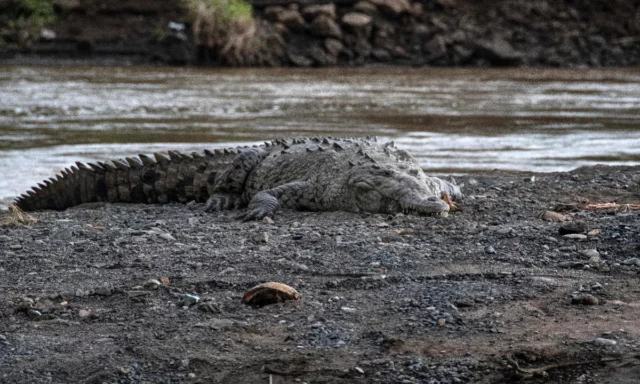Around 2,000 American crocodiles (Crocodylus acutus) inhabit the Tárcoles, which rises in the Central Cordillera, near San José, and into which sewage and garbage have been dumped for decades, invading the ecosystem at its mouth, in the Gulf of Nicoya. “It is a highly contaminated area, but this has not affected the crocodile populations”, Iván Sandoval, a biologist at the National University of Costa Rica, told AFP.
On the banks of the Tárcoles these animals rest in the sun, impassive to pollution, feeding on fish that come up the riverbed from the sea. Although some 150 types of bacteria have been detected in these waters, crocodiles “are not necessarily affected by them”, says Sandoval. “The Tárcoles river is the most polluted river in Costa Rica and even one of the most polluted in Central America. It has a large amount of discharges from the entire urban area. Heavy metals, nitrites, nitrates, as well as a large amount of waste remains can be found humans”, adds the crocodile expert.
They are “living fossils”
These huge reptiles “are living fossils” that have the ability to tolerate very difficult conditions, the researcher points out. “They have not had to change anything in millions of years; in their natural design, they are perfect”.
Although pollution does not affect them, these animals are in danger of extinction in Costa Rica. In contrast, in Brazil the population of broad-snouted caimans (Caiman latirostris) recovered. This led a summit committee of the Convention on International Trade in Endangered Species of Wild Fauna and Flora (CITES), which culminates this Friday in Panama, to authorize Brazil to export captive-born alligators.
New threats to crocodiles
Threatened in the past by hunting, since 1980, crocodile populations “are recovering” in the Tárcoles, although certain activities linked to tourism put this rebound at risk, warns Sandoval. Some tourists feed the reptiles, in a country where feeding wild animals is prohibited. “It has been conditioning the behavior of crocodiles, causing them to get closer instead of being elusive or elusive and getting away from people”, says Sandoval.
Too much garbage thrown daily into the river
Every day, dozens of boats loaded with tourists navigate the river, mostly foreigners, seeking the experience of seeing six-meter reptiles up close and in the wild. Juan Carlos Buitrago, 48, is a boat captain and tour guide and for almost 30 years he has been leading visitors to see the wonders of the fauna and flora of this basin.
Non-boaters can watch the crocodiles from a bridge on the route between San José and the Pacific. Buitrago says that he and other locals regularly remove hundreds of tires and plastics washed away by the current from the riverbank. “The Tárcoles River is known for its crocodiles not (only) nationally but also worldwide. We cannot hide the pollution”, he told AFP resignedly. Buitrago blames the garbage on the more than 2 million inhabitants of the metropolitan area of the capital.

River pollution competes with crocodiles
Costa Rica is famous as an example of environmental protection, with a third of its territory protected, but the law is not always transformed into action, as is the case in Tárcoles. The environmental lawyer Walter Brenes, 34 years old, calls for concrete actions for this basin. “Costa Rica has dedicated itself to the creation of laws, regulations and decrees, trying to think that if we return to all regulations, the problem will be solved”, he told AFP. However, the “regulation does not solve the problem”, which is why it is necessary to “create a true public policy that is completely directed towards the protection of wildlife”, he maintains. While sailing, Buitrago is delighted with the flight of macaws at sunset, but believes that his compatriots should “stop contaminating” a riverbed that he considers his “office”. “Here we try to clean up, to collect the tires, the plastics”, but none of that works “if those at the top continue to contaminate”, he recalls.

